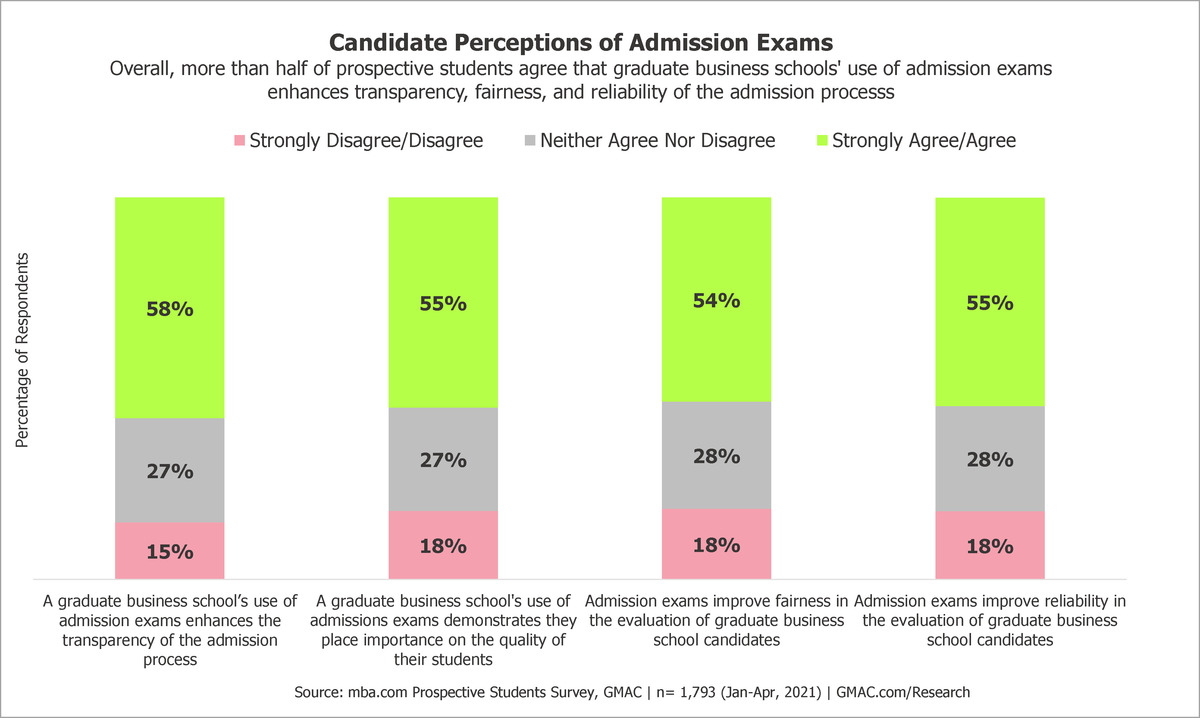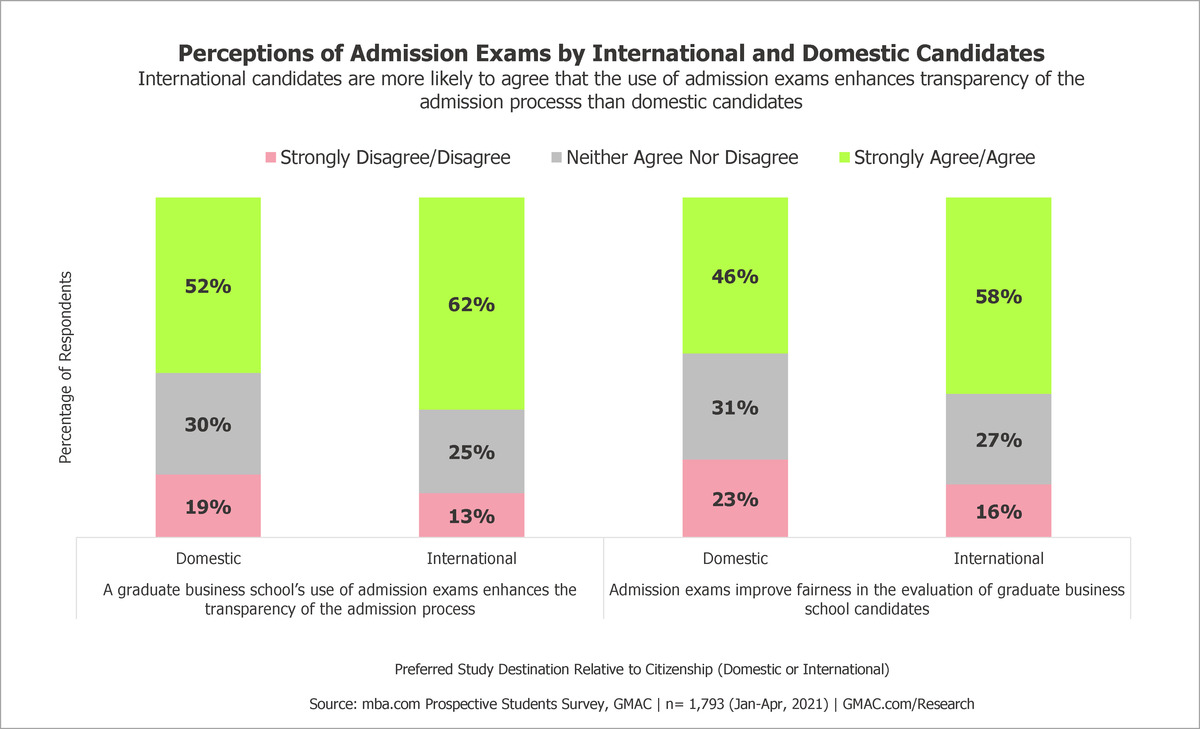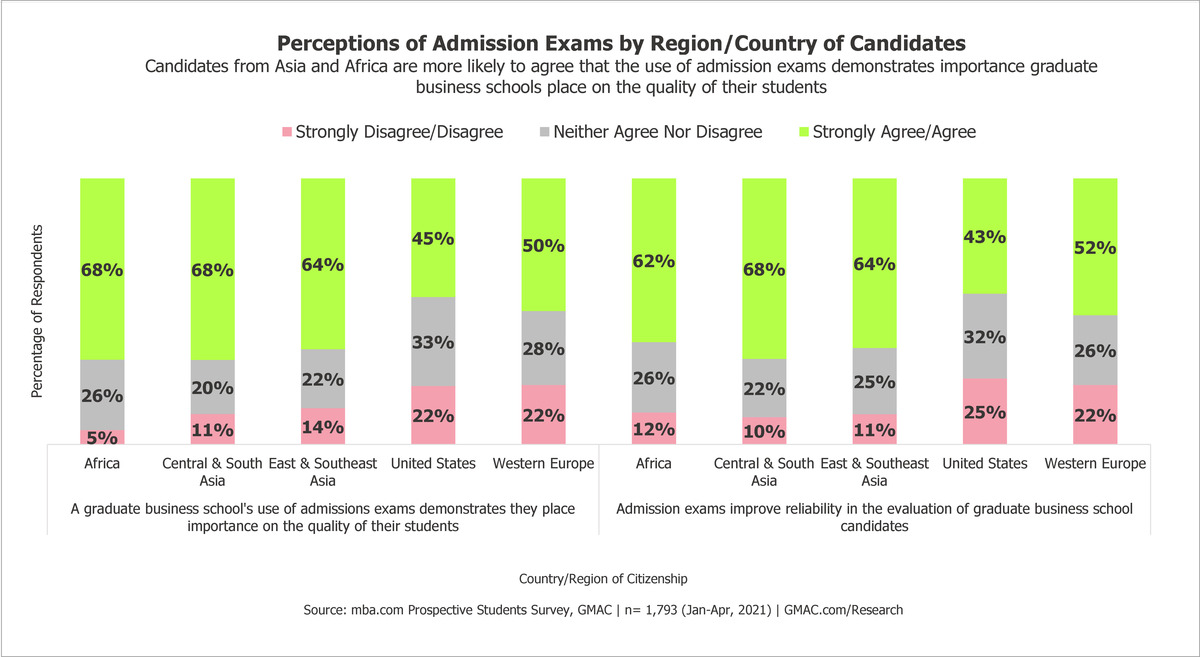A new GMAC survey snapshot of nearly 1,800 respondents shows that more than half of prospective students believe that admissions exams improve reliability, fairness, and transparency in evaluating graduate business school candidates. The data collected through mba.com Prospective Students Survey also highlights the diversity of candidates as their perceptions vary by region of citizenship and by preferred study destination (domestic or international). This data addresses questions raised by schools in the Information Needs Survey released earlier this year. It also provides insights to inform schools as they shape their global recruitment strategy.

The 2020 Application Trends Survey of over 1,000 graduate management programs worldwide showed that the 2019-2020 admissions season was unlike any other. As the pandemic unfolded and test centers closed, many business schools were compelled to adopt flexible admissions policies, such as extended deadlines, deferral policies, and test waivers. With the launch of GMAT Online, candidates and schools overcame the disruptions of the test center availability. However, some schools remained curious about candidate perceptions of admission exams. They asked us to gauge what admission exams signaled to candidates about business schools, and if that signal varied by candidate segment?
As a part of GMAC’s non-profit mission to “provide the tools and information necessary for schools and talent to discover and evaluate each other,” we responded by including a set of questions in the monthly mba.com Prospective Students Survey. These questions complement the previous data on the use of GMAT in graduate management education (GME) admissions and its role in reducing subjectivity and underlying bias. Likewise, prior research published in the Academy of Management Learning & Education concluded that “…the GMAT does better than we thought in predicting future academic performance and persistence in graduate programs in business schools, which is, in turn, positively related to future job performance” (p. 568).
Given below are the summary findings about candidate perceptions of admissions exams on a five-point scale (Strongly Agree to Strongly Disagree).
Majority of candidates agree on the use of admissions exams
Overall, more than half of prospective students agree that graduate business school's use of admission exams enhances transparency, fairness, and reliability of the admissions process. On the flip side a small proportion of candidates disagree with the statements related to the use of admissions exams. In particular, only one in six (15%) candidates disagree that a graduate business school's use of admission exams enhances the transparency of the admissions process.

International candidates are more favorable to admission exams
International candidates are more likely to agree that use of admission exams enhances the transparency and fairness of the admissions process as compared to domestic candidates. Given the level of importance international candidates place on the use of admissions exams, business schools should consider the perception that the admissions process has become less transparent, and fair in the absence of admissions exams.

Perception of admissions exams varies by regions
More than half of candidates (52%) from Western Europe and 43 percent from the US agree that admissions exams improve reliability in the evaluation of graduate business school candidates. Prospective students from Africa (68%), Central & South Asia (68%), and East & Southeast Asia (64%) are more likely to agree that the use of admissions exams demonstrates the importance graduate business schools place on the quality of their students. This is significantly higher than the perspective of candidates from the US (45%) and Western Europe (50%). As many business schools continue to attract and enroll a diverse pool of candidates, they need to recognize the regional differences in the perception of admissions exams as an indicator of quality of business school.

Conclusion
Despite the negative impact of COVID-19 on many aspects of enrollment management, doubling down to attract and admit the best-fit, diverse talent that succeeds as today’s student and tomorrow’s alumni continues to be a priority for business schools. This timely data provides candidate insights to help business schools inform their decisions and assess the possible implications of those decisions. The data shows that most candidates believe that admissions exams improve reliability, fairness, and transparency in evaluating graduate business school talent. The diversity of perception among candidates is also illustrated by region of citizenship and preferred study destination (domestic vs. international). Based on this data, a couple of questions for business schools to consider in crafting their recruitment and selection strategy include:
- How could the lack of objective data impact the perception of transparency, fairness, and reliability of the admissions process?
- What are the implications on attracting prospective international students as they view standardized exams as a signal of the quality of the cohort and hence the school?
---
About the Survey
The findings summarized in this blog are based on the data collected through the mba.com Prospective Students Survey between January and April 2021 from a total of 1,793 individuals worldwide. International candidates are defined by their preference to study in a destination outside their country of citizenship. For example, a US citizen preferring to pursue GME in Spain would be categorized as an international candidate. Nearly 60 percent of the total respondents are international candidates and 40 percent are female candidates. These findings reflect the users visiting mba.com and should be interpreted with caution in the rapidly evolving context of COVID-19.
